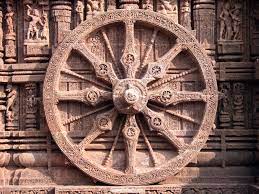Hinduism has a cyclic approach to time. There are endless cycles of expansion and contraction of the cosmos according to Hindu philosophy. This is a feature shared with most Eastern religions. This concept is the basis for the theory of Karma and forms the basis of the scientific approach of Hinduism, along with the Hindu approach of seeking the truth, and the need for proof or evidence.
This approach is very different from linear concepts of time, where there is a point of creation of the universe, and a point of dissolution or apocalypse.
The cyclic concept of time leads to the Hindu concept of Karma. In essence, Hinduism believes that what the future holds is a result of one’s actions, rather than an act of judgement of an all-powerful God at the time of apocalypse.
With the cyclic concept of time and the theory of Karma, human beings have autonomy in their functioning during their lifetime. They are expected to evaluate their beliefs and the situations they are in and take the right course of action. The scriptures only serve as a guide and are not dogmatic in nature.
The theory of Karma and the consequent need for humans to make informed decisions is emphasised in all Hindu scriptures including the Bhagavad Gita. This approach infuses a scientific basis to the daily life and spiritual progress of the Hindus.
